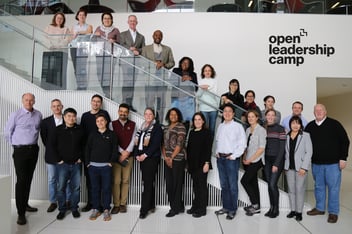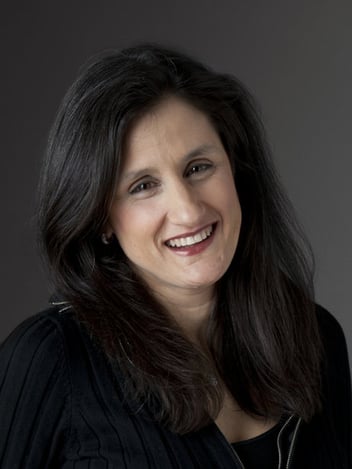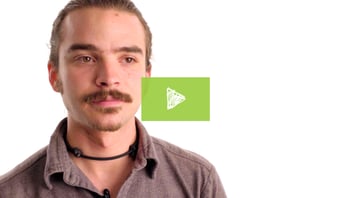I Found a Job I Love Along a Meandering Path

Rekha Murthy (Explo student, 1990) is Director of Projects + Partnerships at Public Radio Exchange (PRX), where she finds innovative ways for public media stations and producers to reach new audiences and grow revenue.
What do you remember about Explo?
I really enjoyed Explo. I thought it was a great place. I had been to a bunch of summer camps before. Explo was filled with interesting people, and no one was at all cliquish. I remember that I took an astronomy class and the instructor was really good. One day he saw that someone looked really sleepy in class and he used that as a teaching opportunity. He told us when we were tired to always look at a light. This would stimulate the rods and cones in our eyes and help us stay awake. I still use that trick today.
When did you start thinking about what kind of career you wanted?
I probably started thinking about it during my sophomore year in college when I had to pick a major. I majored in International Relations and interned at the Council on Foreign Relations so I thought that I might have a career at the U.N. or something similar.
What changed in your thinking about a career?
I was also very interested in Comparative Literature and books and writing. I was an editor and photographer at the Brown Daily Herald. I can’t remember who it was, probably a professor or someone from the career office, but they told me that given my interests I should consider jobs in publishing.
That's interesting. And you listened to them?
Yes, the idea excited me but I was struggling to find my way. Figuring out a career was a murky process for me. I grew up in a community of doctors and lawyers, so I didn’t have any models of people doing things that I wanted to do, not that I even knew what I wanted to do. I got an entry-level job at Houghton Mifflin in their Subsidiaries Department. I was surrounded by books, which I loved, my co-workers were good people, and I was involved in working on licensing film rights and international publishing rights for different projects – I felt like this tied into my international interests. Of course, I was also answering the phones.
So then what happened?
It was 1996 in New York City and Silicon Valley was just becoming a big thing. I had taken a class during my senior year at Brown about how to use the internet and how to create a basic website. At the time, Houghton had one computer connected to the internet. I spent a lot of time using it to write long email letters to my college friends (that was how people used email then, to write long letters), and a friend told me that lots of these new internet companies would hire anyone who had even a little experience. I was curious so I made a few inquiries and I got a job immediately at a startup called Avalanche as a production assistant. Things were moving so quickly that eight months later I was a project manager building websites.
Amazing! Did you like it?
Yes! All of a sudden it was the cool new thing. I was part of a new industry that was hungry for talent and willing to train people, so you could rise very quickly. At the same time, the industry was also unstable. After two years I got laid off at Avalanche, but five companies recruited me in two days. One guy told me to come in for an interview immediately. I told him I was in my bathrobe and he said, “Throw on some clothes and get in here now.”
Where did you go next?
I got a job at a company called Organic where I designed an early version of barnesandnoble.com. It was one of the very first e-commerce sites.
How did you make the jump to NPR (National Public Radio)?
I spent eight months at Organic. I saw a job listing for a spot at the then new NPR website to be an editor and online writer and something really clicked. Here was a job that would combine my web expertise with my interest in journalism. Also, I grew up listening to NPR with my parents so it was exciting. At the time, NPR was still all about radio, and the web side didn’t get much respect at all so I applied for an internal fellowship at “All Things Considered” where I was eventually hired as a Production Assistant.
What does that mean? What did you do as a Production Assistant?
I mixed the reporters’ pieces for broadcast, I did background interviews for the hosts, I went out into the field to report stories, and I got to do a few stories of my own – some music and book reviews, stuff like that.
So you weren't using your web experience at all? Was that upsetting?
It was good to be working for a “mature” organization. And, I have to be honest, it wasn’t until my parents heard Robert Siegel announcing my name during the “All Things Considered” credits that they stopped bugging me about going to grad school!
Had you been considering graduate school?
Yes, but I never felt ready, I never knew exactly what I would go study. It is funny, but in retrospect, I think that I didn’t go to graduate school until I did because the program that I was looking for didn’t exist yet. I had always described myself as having eclectic interests and talents. Finally someone said to me, “Oh, that means you should look at Media Studies." My work in radio, journalism, photography, and web design all made sense as a part of Media Studies! When I figured that out, I went to MIT and loved it. Everyone in my class had also done a million different things. I mean there was a biologist in the room alongside a video game producer.
That's really exciting! What did you do after MIT?
I worked as a User Experience Designer, helping companies design their websites until a friend invited me to a PRX holiday party. PRX was a new entity – an entrepreneurial non-profit that was a distributor and creator of shows for public radio.
How would you describe your job as Director of Projects + Partnerships at PRX?
PRX is using technology innovation to secure public radio's future in a digital world. I am involved in radio program distribution--giving a second, third, and more lives to programs that might otherwise have aired just once. This is particularly exciting at a time when more listening is migrating from broadcast to the internet. Think internet radio stations, podcasts, mobile streaming, satellite radio. I've worked closely with iTunes for years, placing shows in the iTunes Store for sale, among other things. I was part of the PRX team that built one of public radio's first mobile apps, the Public Radio Player. I work to raise the visibility of public radio on digital listening platforms like iTunes, TuneIn, and Stitcher. Right now I'm working with PRX's new podcast network, Radiotopia, a group of amazing storytelling podcasts banding together to increase audience and revenue without depending on traditional broadcast stations. It's an exciting time to be in public radio!
So you really found a way to combine your journalism and literary background with your web expertise, even though you pursued those things at different points in your career.
Yes, and I love my job but it was a meandering path.
So what would your advice be to folks just starting out in their careers?
First, I would say try to expose yourself to a wide variety of careers by reaching out to people actually doing them. Your idea of a profession isn’t always the reality so reach out to everyone you know. Also, remember that ambiguity along the way is OK; just be open to new opportunities. A lot of what I do now did not even exist when I was starting out so you have to be flexible. Find your own answers and don’t be scared to make a change!



